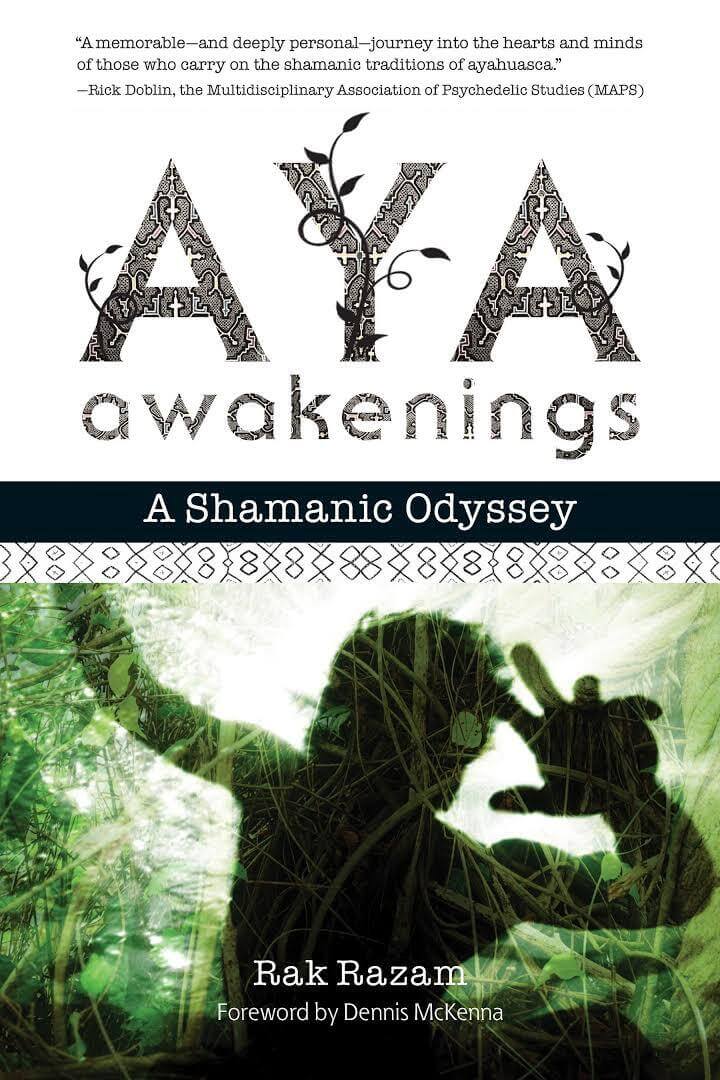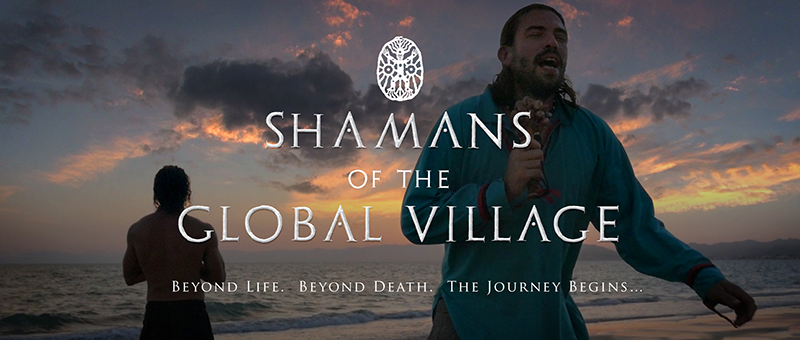For those who don't know, Ayahuasca is a hallucinogenic (visionary) brew and vegetal medicine that's used in the Amazonian basin by many different tribes indigenously through Peru, Ecuador, Colombia, and Brazil. It's potentially thousands or tens of thousands of years old and has been used for cleansing the body and connecting back to Gaian planetary intelligence.
Ayahuasca is a brew concocted from a vine called banisteriopsis caapi and a mixture of plants, usually chacruna or chaliponga – which contain the visionary DMT, or dimethyltryptamines. These tryptamines also occur naturally in the human brain and are threaded throughout nature. Essentially, ayahuasca is a purgative. Indigenous cultures used it to cleanse their systems, to keep them clear, regulated and healthy. The chacruna, which contains the DMT, brings on incredibly deep and pronounced visionary states.
People can have very profound healings. They say that it's like you live a decade of psychotherapy in one night. On a mental level, I find that your subconscious sort of leaks through or comes up and any traumas or issues or things that have been suppressed or buried come into the conscious mind.
Once they're conscious, they can be worked through and healed and also purged and released. Because ayahuasca is a purgative, you quite often vomit on the substance, but it's cleaning you out physically, and it's also really helping clear that emotional baggage.

Learn more about Amazonian hallucinogenic shamanism

Read the book that started the journey of discovery
The Shamans of the Amazon
In much of Peru, their medicine people call themselves curanderos – from the Spanish, which means to heal. Before the Westerners came, the curanderos were the village healers or the village doctors in a real sense.
There are different types of healing work, there are the ayahuasqueros that work solely with ayahuasca, but there are also vegetalistas who work with many other healing plants. The majority of those plants aren't psychedelic. They're just for cleansing and healing on different levels.
The curanderos sing and guide you with their singing (they call their songs the icaros), and they are like magical songs or vibrational codes. So there'll be lyrics in the songs, but the actual chants themselves and the song's vibration and the rhythm are like a calling code for the spirits in the plants. They're calling them into the ceremony.
In the indigenous understanding of medicine, they mean something very different from what we mean from medicine. They don't mean just take this plant, and it has a chemical in it; they think in terms of relationships with nature, and so they know that ayahuasca is in a relationship with the chacruna in the brew, and they're all in a relationship with the other plants of the forest and all of those relationships involve a spiritual component which gives it its power.
In that context, the many different curanderos told me that they were seeing a vast number of Westerners come down to the jungles of Peru in search of ayahuasca. They didn't identify necessarily as having a physical illness. However, those curanderos, those shamans of the Amazon, could see that the vast majority of Westerners were still sick, and they said that what they had was a sickness of the soul.
They had a disconnection, and they were coming in search of meaning. They were coming in search of belonging and relationship, and knowledge to know themselves and to know what their culture had not been able to provide for them – a sense of understanding of who we are and what our place is in the universe.

Learn more about Amazonian hallucinogenic shamanism
Again, it's not that ayahuasca just does this, but ayahuasca has a lineage, it has a connection to the indigenous tribes of the Amazon, it has a practice and a container in the ceremony, in the ritual, and it creates a space where people could go and have this experience. It's not even really about the ayahuasca. It's what ayahuasca revealed within themselves, which was these deeper levels of understanding, realizations of things that we've all buried within ourselves.
People essentially say that you're a spiritual being having a human experience. You're not just a physical, biological being like a biological robot that needs to jump through the hoops, go to work and get married, have kids, get a pension, and die. They're all the trigger points along a spiritual journey, perhaps, but they're not the be-all and end-all. There is a deeper capacity we have within ourselves to connect to something larger. To remember who and what we really are.
We're not just physical beings, we are spiritual beings, and we have this capacity. So the whole understanding of what religion really means – in Latin, the word religion means to “re-weave or to reconnect”. What we're actually connecting to is Mother Earth. Her nature is what we come from. We're not separated from nature, and we're not just part of nature. We are nature.
Mother Earth and the Web of Life
What ayahuasca revealed to me is this interconnected, interdependent web of being, but also that, just like in our human body, we've got these levels - we as a species are part of nature.
She is using us just like we might use all the calcium in our body or have white blood cells doing this or that processing. There are relationships of organisms within our body just as there are within nature, and once you start to open to that, you find your place. You understand that we are not alone and that we're bigger than we thought we were.
I think this is the real value of psychedelics and entheogens: they reveal the capacity of what we are, and we need that going forwards if we're going to be sustainable as a human civilization or as a Gaian civilization.
If we're going to survive, we need Gaian consciousness because the whole thrust of the last ten thousand years of history has been to see ourselves as separate from nature and then take and destroy, to strip bare and create incredible imbalances that are now threatening the ecological sustainability of nature herself and our ability to survive.
Essentially, ayahuasca in the West has been very predominant for the last two decades or more in healing and cleansing people and preparing them for their own capacity and endogenous ability. It’s teaching us to not rely upon the shamanic plants outside of ourselves, but to explore our own shamanic and spiritual potentials, to plug back into these states of unity consciousness.
This idea of the Earth as the Mother is as old as humankind itself. Because we understand that we have been birthed, we understand that we are in something larger than ourselves, but we have forgotten that you have to respect the Mother. You are in a relationship with the Mother, and you can't just continue to take from her. We're seeing that now with the crux of history. We're seeing the ecological devastation, the world out of balance that happens without understanding the consequences of our actions.
Do We Have Species PTSD?
It seems to me that we basically have what I call “species PTSD”, and as a human race, something happened in the past that some or many of our religious texts like the Christian Bible and other very old myths point towards regular cycles of time where the earth goes through climatic changes.
Even the epic of Gilgamesh points to the story of planet-wide floods, to a large ecological sort of event which threatened to wipe out humankind. All indigenous cultures with oral histories also have stories of death and rebirth.
And then there are the ancient stories of a “fall” of consciousness, of the idea that we used to have a different, perhaps more elevated consciousness than we do now. We as a species essentially had this connection to a level beyond egoic consciousness and somehow connected to a more unity state. The same interconnected oneness that the plants themselves are perhaps in. And we've had a fall from that. We lost our connection in that fall.
And it seems that this is at the root trauma of the human species on a spiritual level. Because of that disconnect from our relationship with the Source itself, with this interconnected feeling, we feel lost in the web of life, in nature herself.
And in that aloneness, we have created ever-intricate boxes to inhabit that reinforce our separation and trauma. And this, perhaps, is why the planetary intelligence is reaching out through the psychoactive plants to bring the people back home.
To the garden.
People now who are working with ayahuasca are the first modern generation starting to work with this indigenous medicine, and ayahuasca is also a vine, and her tendrils are reaching out to embrace the world. She's now grown all around the world in climatic conditions that are suitable for her, and she's becoming a global medicine.
Key takeaways
- Ayahuasca is a brew that's concocted from a vine called banisteriopsis caapi and a mixture of plants; usually chacruna or chaliponga (depending on what area you're in), which contain dimethyltryptamine, which also occurs naturally in the human brain and is threaded throughout nature.
- There are different types of shamanic healing work in the Amazon, there are ayahuasqueros that work with ayahuasca, but there are also vegetalistas who work with many different healing plants and many others.
- People essentially say that you're a spiritual being having a human experience. You're not just a physical, biological robot that needs to jump through the hoops, go to work and get married, have kids and have a pension, and die.
- I think this is the real value of psychedelics and entheogens: they reveal the capacity of what we really are, and we need that going forwards.

